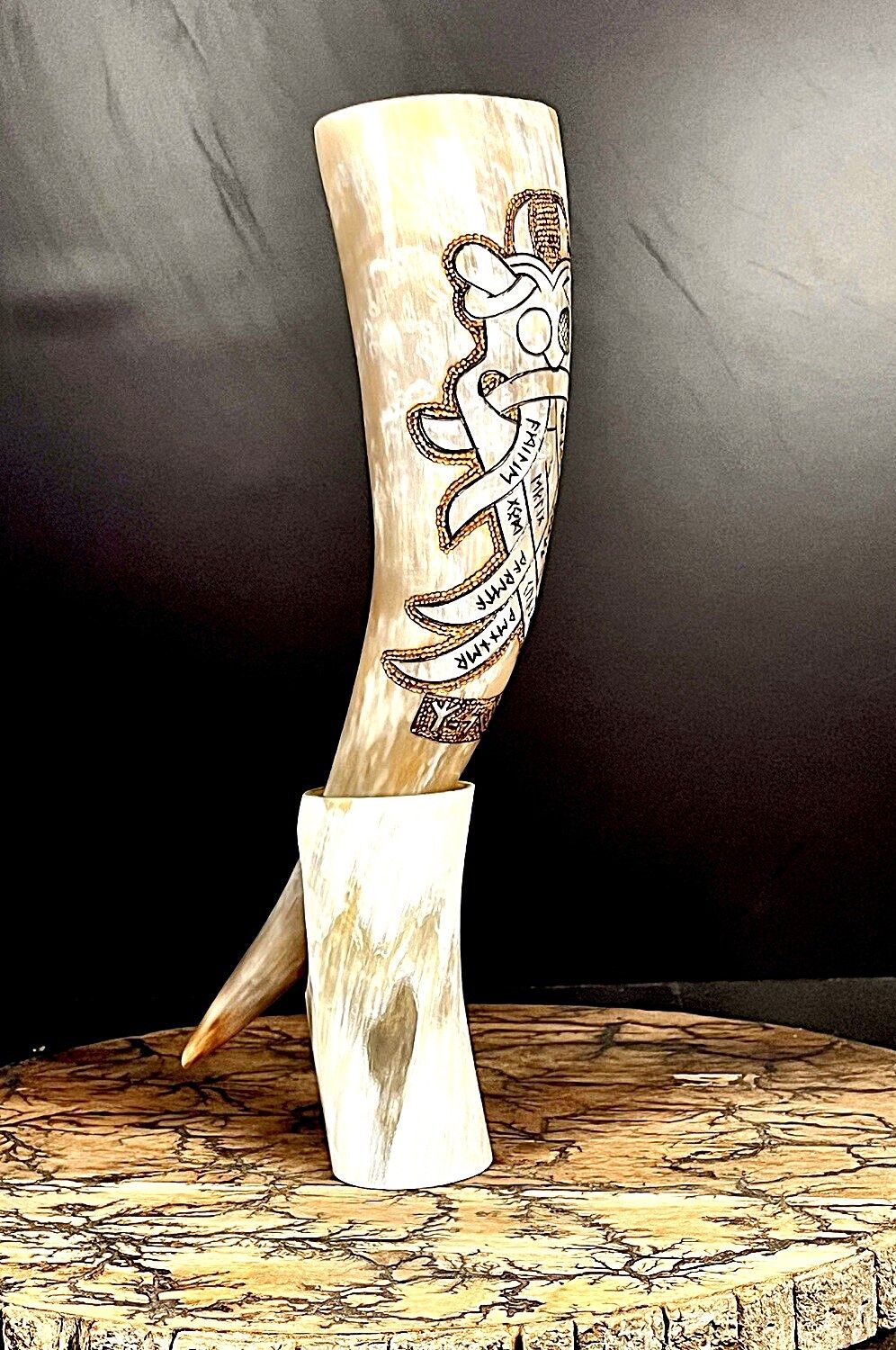Crafting Norse Art Excellence: Premium Viking Drinking Horns Collection - "Allfather" (God Odin Horn)
Viking Drinking Horn "Allfather" (God Odin Horn)
Complete Gift Set. SKAL Collection from AlgizRune Workshop
IMPORTANT NOTICE: Free International shipping from Canada!
Embrace the Viking spirit with our Premium Quality Viking Drinking Horns and Mugs, thoughtfully designed as a gift set. Each set includes a beautifully crafted stylish gift bag for convenient storage or gifting, stand and leather belt also included - perfect for LARPing (Live-Action Role-Playing) adventures, as Viking movie props, Viking home or restaurant décor.
This Drinking horn available in two sizes, 400-500 ml and 700 ml - 1 Litre, these drinking horn cups are not just vessels; they're a piece of Viking heritage ready to elevate your drinking experience.
Carefully polished and cleaned top quality drinking horn that is safe to drink from. The shape and colour of the horn may differ from that in the picture. It suites cold drinks like Beer, Mead, Wine. Horn cups not suitable for strong alcohol drinks, dishwashing machines, microwaves, etc.
Wash it with warm water after using and it will work for you for 1000 years:)
Norse Horn masterpiece came from Algizrune Norse Pagan Arts Workshop Canada. Design protected by UK and Canadian Law.
Important: Free shipping for our SKAL horns made from Canada so import taxes may apply on importation in other countries and its buyer responsibility.
God Odin Drinking Horn & Valhalla:
In Norse mythology, Odin, the chief of the Aesir gods, was associated with a special and symbolic drinking tradition, and he was believed to reside in the grand mead hall of Valhalla. Here's an overview of Odin's drinking tradition and Valhalla:
- Drinking Tradition: Odin was known for his deep connection to mead, an alcoholic beverage made from fermented honey and water. Mead was a significant part of Norse culture and often associated with feasting, storytelling, and hospitality. Odin's connection to mead was particularly evident in the quest for wisdom and poetic inspiration.
In one myth, Odin sacrificed one of his eyes at Mímir's well, a mystical spring of wisdom, in exchange for a drink from the well. This sacrifice symbolized his pursuit of knowledge and poetic inspiration. It was believed that the knowledge he gained from Mímir's well allowed him to understand the runes and have insight into the mysteries of the cosmos.
Odin was also associated with the mead of poetry, a magical drink that could grant the gift of poetic inspiration to those who consumed it. In the myth of the mead of poetry, Odin engaged in a daring quest to obtain the mead from the giants who guarded it.
- Valhalla: Valhalla, often spelled "Valhöll" in Old Norse, was the grand mead hall in the realm of Asgard, the home of the Aesir gods. This legendary hall was reserved for the bravest and most heroic warriors who died in battle. It was a place of eternal feasting, where these valiant warriors, known as Einherjar, would be taken by valkyries to prepare for the ultimate battle of Ragnarok.
In Valhalla, the warriors would engage in combat, feasting, and storytelling during the day. However, each evening, their wounds and injuries would magically heal, allowing them to repeat the cycle the next day. The promise of a glorious afterlife in Valhalla was a powerful motivation for Norse warriors to display bravery and valor on the battlefield, as death in battle was seen as the surest path to this hallowed hall.
Odin was the patron god of Valhalla, and he personally oversaw the selection of warriors to be taken to his hall by the valkyries. He presided over the feasts and battles in Valhalla, and his connection to mead and poetic inspiration was celebrated in this magnificent hall.
The combined themes of mead, bravery, and the promise of Valhalla were central to Norse warrior culture, reflecting the values of heroism, honor, and the belief in a glorious afterlife for those who died in battle. This aspect of Norse mythology continues to capture the imagination of many to this day.

